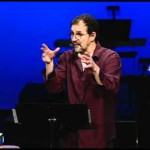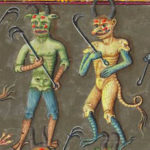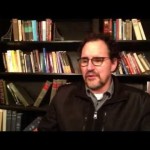We run our website the way we wished the whole internet worked: we provide high quality original content with no ads. We are funded solely by your direct support. Please consider supporting this project.

5 Ways the Bible Supports Open Theism
Open Theism refers to the belief that God created a world in which possibilities are real. It contrasts with Classical Theism which holds that all the facts of world history are eternally settled, either by God willing them so (as in Calvinism) or simply in God’s knowledge (as in Arminianism). Open Theists believe God created humans and angels with free will and that these agents are empowered to have “say so” in what comes to pass. In Open Theism, therefore, what people decide to do genuinely affects God and affects what comes to pass. In particular, by God’s own sovereign design, things really hang on whether or not God’s people pray.
The primary reason Open Theists believe what they do is because they find that Scripture presents the future as partly open. While there are certainly passages that depict God predetermining and foreknowing some aspects of the future, there are at least as many passages depicting God as facing a future partly comprised of possibilities. A small sampling of these sorts of passages are the following:
- The Lord frequently changes his mind in the light of changing circumstances, or as a result of prayer (Exod. 32:14; Num. 14:12–20; Deut. 9:13–14, 18–20, 25; 1 Sam. 2:27–36; 2 Kings 20:1–7; 1 Chron. 21:15; Jer. 26:19; Ezek. 20:5–22; Amos 7:1–6; Jonah 1:2; 3:2, 4–10). At other times he explicitly states that he will change his mind if circumstances change (Jer. 18:7–11; 26:2–3; Ezek. 33:13–15). This willingness to change is portrayed as one of God’s attributes of greatness (Joel 2:13–14; Jonah 4:2). If the future were exhaustively and eternally settled, as classical theism teaches, it would be impossible for God to genuinely change his mind about matters.
- God sometimes expresses regret and disappointment over how things turned out—even occasionally over things that resulted from his own will. (Gen. 6:5–6; 1 Sam. 15:10, 35; Ezek. 22:29–31). If the future was exhaustively and eternally settled, it would be impossible for God to genuinely regret how some of his own decisions turned out.
- At other times God tells us that he is surprised at how things turned out because he expected a different outcome (Isa. 5:3–7; Jer. 3:6-7; 19–20). If the future were eternally and exhaustively settled, everything would come to pass exactly as God eternally knew or determined it to be.
- The Lord frequently tests his people to find out whether they’ll remain faithful to him (Gen. 22:12; Exod. 16:4; Deut. 8:2; 13:1–3; Judges 2:20–3:5; 2 Chron. 32:31). If the future were eternally and exhaustively settled, God could not genuinely say he tests people “to know” whether they’ll be faithful or not.
- The Lord sometimes asks non-rhetorical questions about the future (Num. 14:11; Hos. 8:5) and speaks to people in terms of what may or may not happen (Exod. 3:18–4:9; 13:17; Jer. 38:17–18, 20–21, 23; Ezek. 12:1–3). If the future were exhaustively and eternally settled, God could never genuinely speak about the future in terms of what “may” or “may not” happen.
So the Bible presents God as interacting with a world that is moving into a partly open future. This doesn’t mean that God could ever be caught off guard or that his overall purposes for the world are ever threatened. Because they believe God is infinitely intelligent, Open Theists affirm that God anticipates each and every possibility from the foundation of the world, as though it were a certainty. Whatever comes to pass, God has a plan in place to respond to it, bringing good out of evil when this is necessary. But, unlike Classical Theists, Open Theists are confident that God is so smart, he can sovereignly rule the world effectively without needing to have everything pre-settled in his will or mind ahead of time.
__
art: “Trees by the Gein at Moonrise
by: Piet Mondrian
date: 1907 – 1908
Category: General
Tags: Arminianism, Bible, Calvinism, Free Will, Open Theism
Topics: Defending the Open View
Related Reading

Does The Open View Limit God?
Suppose you and I both agree that God is omniscient and thus knows all of reality, but we disagree over, say, the number of trees on a certain plot of land. I say there are 1,300 and you say there are 2,300. You wouldn’t say that I am limiting God because he knows fewer trees…

Why believe in free will? [Video]
In this video excerpt from his April 29, 2012 sermon tracing the Pietistic influence on Woodland Hills Church, Greg explains why they—along with John Wesley—believe that God does not control everything, but rather gives human beings free will.

Podcast: Doesn’t Jesus Violate the Free Will of Demons When He Casts Them Out?
Greg discusses the free will of demons and speculates on whether God is ever violent towards spiritual entities. http://traffic.libsyn.com/askgregboyd/Episode_0163.mp3

What is the significance of Numbers 11:1–2?
The Lord was in the process of judging Israel by fire when Moses interceded in prayer “and the fire abated.” A common sense reading of the verse suggests that the fire would have continued had Moses not prayed. Scripture is full of examples of God changing his plans in response to human prayer and repentance.…

How do you respond to Zechariah 12:10?
“when they look on the one they have pierced, they shall mourn for him…” Hundreds of years before Christ was born it was declared that he would be pierced (cf. John 19:24–27). Detailed prophecies such as this one help convince us that Jesus is the Messiah hoped for in the Old Testament. The ministry and…

Why Bart Ehrman Doesn’t Have to Ruin Your Christmas (Or Your Faith) Part 6
This is the sixth of several videos Greg put together to refute Bart Ehrman’s claims published in the article What Do We Really Know About Jesus? In this segment, Greg addresses the apparent discrepancies in the genealogies of Luke and Matthew and the implausibility of the idea that they were simply fabricated. We’ve been hearing that people are using…
